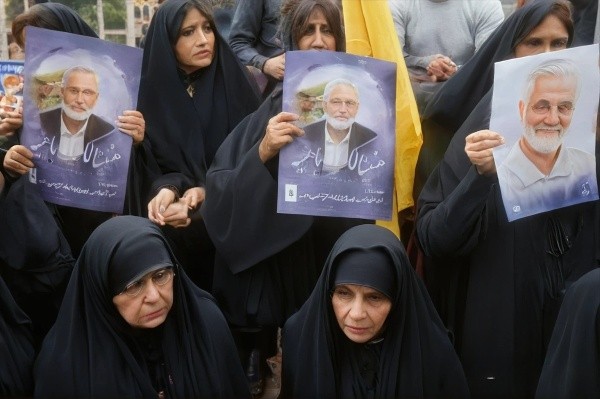The Death of Hamas Leader Yahya Sinwar: What We Know So Far
Israel and the US claim intelligence provided Sinwar’s whereabouts, but this is doubtful.
Loading...

With tension in the Middle East at its highest since October 7, how did we get here and what could happen next?
Escalating Tensions in the Middle East
The Middle East is experiencing heightened tensions following the assassination of Hamas political chief Ismail Haniyeh in Tehran and leading Hezbollah figure Fuad Shukr in Beirut. These events have intensified the likelihood of an Iranian retaliation against Israel, potentially igniting a regional war.
Recent Assassinations and Their Impact
Israel is widely believed to have orchestrated Haniyeh’s assassination and has claimed responsibility for Shukr’s killing. This follows months of devastating attacks on Gaza, resulting in nearly 40,000 Palestinian deaths. The situation has escalated, raising fears that Lebanon could be the next target if the conflict extends.
Although it has been almost a week since the assassinations, no major attack on Israel has occurred yet. Diplomats are actively working to prevent further escalation. However, Iran has vowed to respond, with Ministry of Foreign Affairs spokesperson Nasser Kanaani stating that regional stability can only be achieved by "punishing the aggressor and creating deterrence against the adventurism of the Zionist regime [Israel]."
Potential Iranian Responses
The critical question now is how Iran will respond. Will it opt for a measured reaction to avoid a regional war, similar to its response to an Israeli attack in April? Or will it choose a more forceful approach, even at the risk of a broader conflict?
Bringing the Region to a Boiling Point
The assassination of Haniyeh has pushed tensions to their highest since last October, when a Hamas-led attack resulted in over 1,139 deaths in Israel and more than 200 hostages taken. Israel’s subsequent war on Gaza has left the enclave in ruins, displacing millions and killing nearly 40,000 Palestinians.
Just before Haniyeh's assassination, Israel killed Fuad Shukr, a senior Hezbollah member, in Beirut. Israel blamed Shukr for an attack in the Israeli-occupied Golan Heights, which resulted in the deaths of 12 Druze children and young people, though Hezbollah denied responsibility.
Israel's Continued Aggressions
Since October 7, Israel has eliminated at least 39 commanders or senior members of the pro-Iranian "axis of resistance," according to monitoring group ACLED. This series of assassinations has brought the region closer to a potential war with devastating consequences for the Middle East.
Prime Minister Benjamin Netanyahu, addressing the nation, acknowledged the likelihood of an Iranian response, stating, "Israel will exact a very heavy price for aggression against us from any arena." He emphasized Israel's readiness for any scenario and its resolve to respond to threats.
An Opportunity for Iran to Show Restraint
Despite the gravity of Haniyeh’s assassination, analysts believe Iran's response will likely be measured. While the killing on Iranian soil is a significant affront, experts suggest that Iran's leadership, under President Masoud Pezeshkian, aims to avoid a broader regional war with Israel and the United States.
Reza Akbari, Middle East and North Africa program manager at the Institute for War and Peace Reporting, noted that Iran's decision-makers are likely to seek a balanced retaliation without triggering an escalatory cycle. Iran's recent diplomatic engagements, including with Jordan, indicate a preference for controlled responses.
Internal and External Pressures
Internally, Netanyahu faces dwindling support and multiple legal challenges. Analysts suggest that ending the fighting could lead to his political downfall and possibly early elections. Netanyahu has long warned of an Iranian threat and may now see an opportunity to push the US towards confrontation with Iran.
Hezbollah's Role and Strategic Considerations
Beyond Iran, Israel must also consider the response from its allies, particularly Hezbollah. Hezbollah leader Hassan Nasrallah has stated that Israel's actions have crossed red lines and a response is inevitable. The coordination between Iran and its "axis of resistance" allies will be crucial in determining the nature and scale of their retaliation.
Imad Salamey, a political scientist at the Lebanese American University, believes that while Hezbollah will coordinate with Iran, their response will aim to avoid a full-scale regional war. Instead, a prolonged, controlled conflict serving strategic interests is more likely.
Conclusion
While Iran's response to Israel is imminent, analysts suggest it will be measured to avoid an all-out regional war. The focus will likely be on demonstrating strength through controlled actions rather than escalating tensions to a breaking point. As the region braces for Iran's next move, the balance between retaliation and restraint will be pivotal in shaping the Middle East's future.
Israel and the US claim intelligence provided Sinwar’s whereabouts, but this is doubtful.
Tata, who passed away on Wednesday, was known for his humility and his expansive vision.
Israel says the major attacks that levelled multiple residential buildings in southern Beirut targeted Hezbollah’s ‘central command’.
